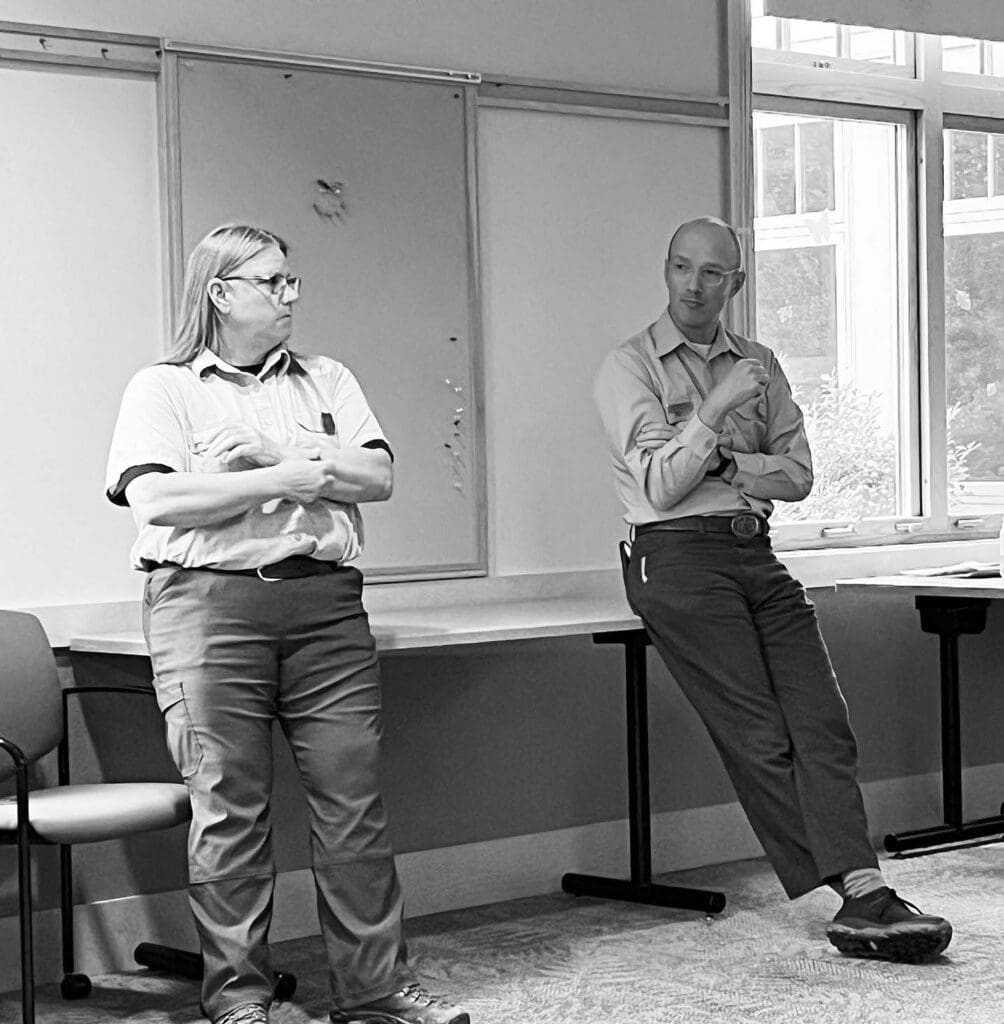Ely, MN – Julie Nester saw it with her own eyes.
“The amount of work that goes into keeping these campsites in the Boundary Waters open is really quite remarkable,” Nester said during an open house July 14 at the Kawishiwi Ranger Station. The event was hosted by the U.S. Forest Service, which announced last month a proposal that would increase the cost of an overnight permit for an adult visiting the Boundary Waters Canoe Area Wilderness from $16 to $40.
Nester spoke during the town hall-style event, expressing her support for the proposed fee increase. She said her experience last May and June working as a volunteer alongside wilderness rangers gave her a glimpse into the hard work that goes into maintaining campsites in the BWCA Wilderness. From digging latrines to taking down hazard trees in and around campsites, she said the many thousands of people who stay in the most visited wilderness in the nation each year would have a much different experience if funding is not available to maintain the 1,900 campsites spread across the wilderness. Therefore, Nester said, if visitors to the BWCA Wilderness want clean, quality, and accommodating campsites, they should support a proposed fee increase for overnight permits.
The event Monday was intended to present to the public why the Forest Service is considering raising the cost of an overnight permit. The cost of the trip will be $40 per adult, regardless of whether the person stays one night or seven nights, or forty nights. The agency says this would be the first permit fee increase for the BWCA in nearly two decades. The fee increase is necessary, the Forest Service maintains, as it needs money to help maintain portages and campsite amenities. The money collected will go toward “improvements to degraded amenities such as fire rings, latrines, and many other improvements,” the Forest Service announced last month.
Nester, who teamed with the Forest Service last summer under something known as the Wilderness Aid program, said she and Forest Service staff used hand tools to rehab campsites, clear deadfall and overgrowth from miles of portages, dig latrines, replace or reset fire grates, and cut hazard trees. The work performed by rangers, volunteer groups, and others in the wilderness is labor-intensive, Nester said.

Cathy Quinn is the wilderness program manager on Superior National Forest. Along with Forest Supervisor Tom Hall, Quinn addressed the many questions that came from the 20 or so people who attended the open house at the ranger station. Quinn said the Forest Service keeps somewhere between 80 to 87 percent of the money it collects from BWCA Wilderness permit fees and other campgrounds on Superior National Forest, and invests that money directly back into the wilderness and other nearby recreation sites, specifically campgrounds on the edge of the Boundary Waters. Currently, the Forest Service collects about $1.3 million every year under the current fee structure for BWCA permits and through other recreation fees on Superior National Forest. If the Forest Service follows through with its proposal of increasing a BWCA Wilderness permit for adults from $16 to $40 and youth permits increase from $8 to $20, the amount the Forest Service would take in would easily double, Quinn said.
Barb Soderberg, an Ely resident and retired Forest Service employee, attended the Monday town hall. Soderberg’s career with the Forest Service started in 1967 on Superior National Forest, and she was intimately involved with crafting the 1978 BWCA Wilderness Act. She retired from the Forest Service in 2007. Soderberg said the Forest Service’s budget for wilderness and recreation used to be 10 times what it is today. Therefore, she said, it’s necessary to increase the cost for people to visit the Boundary Waters.
“To take care of the BWCA you need to increase user fees,” Soderberg said.
The Forest Service has not increased the fee for a BWCA Wilderness permit since 2008. When asked during the town hall meeting why the agency hasn’t raised the permit fee in nearly 20 years, Quinn said there were too many other projects and tasks that got in the way. Hall agreed, saying the Forest Service has been very busy. Moving forward, Hall said, the Forest Service would like to make incremental increases for the cost of a BWCA Wilderness permit rather than a significant increase every 15 to 20 years. Ideally, Hall said, smaller increases for the fees to obtain an overnight BWCA Wilderness permit between May 1 and Sept. 30, known as the quota season, will occur every two to five years, Hall said.
Increasing BWCA Wilderness permit fees will help the Forest Service catch up on over $11 million in maintenance backlog, Hall said.
“We’re underwater in terms of how much work we are behind on across the wilderness,” Hall acknowledged.
The fees will also support staff to once again engage with the public and potentially issue permits at the Gunflint and Kawishiwi ranger stations next year, Quinn said. As Paddle and Portage first reported in April, due to budget restraints and staffing issues, the Superior National Forest is not issuing permits at busy ranger stations in Ely and Grand Marais. The Tofte Ranger Station and area outfitters from Highway 61 to downtown Ely (and everywhere in between) are instead issuing all of the permits for the current quota season.
BWCA Wilderness outfitters contacted by Paddle and Portage ahead of Monday’s town hall at the ranger station generally supported the notion of increasing the permit fees.
“I think the fee increase is long overdue,” said John Schiefelbein, the owner of North Country Outfitters near Ely. “Cost and payroll keep rising. Fees need to keep pace or the (wilderness) will degrade. Nothing is free, even staying home.”
Jason Zabokrtsky from Ely Outfitting Company said he largely supports the fee increase, though he said local residents and summer staff working at the numerous outfitters scattered across the wilderness could feel the impact the most.
“For those people who take three or four trips a year, it will add up,” Zabokrtsky said. “You’ll be looking at $120 in permit fees now if you take three trips in a summer.”
On the east side of the wilderness, Sarah Lynch from Sawtooth Outfitters in Tofte said she supports the fee increases.
“We really don’t see any cons to this,” she said. “It’s still a very inexpensive trip, or vacation, for people.”
Once comments are reviewed and integrated into the proposal, the proposal will go for review and recommendation to something known as the Regional Recreation Resource Advisory Committee. This committee, which is still in the process of being formed, will consist of representatives from a collection of states in what’s known as “region nine,” or the eastern region, of the U.S. Forest Service.
Once the new cost of a BWCA Wilderness permit is approved, the new fee structure is anticipated to begin in January 2027.
There is one more town hall this month being held at the Gunflint Ranger Station in Grand Marais on July 22.



